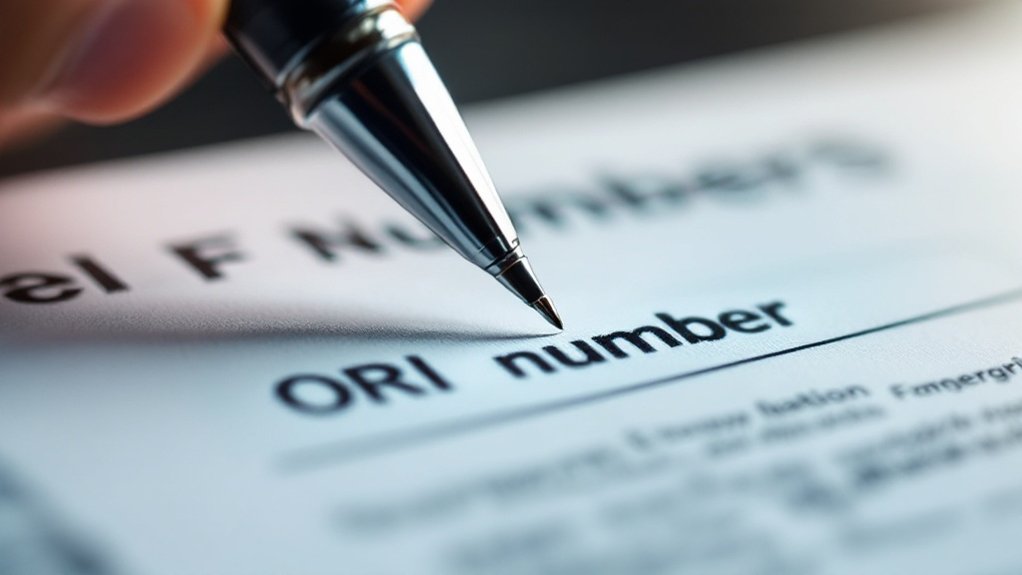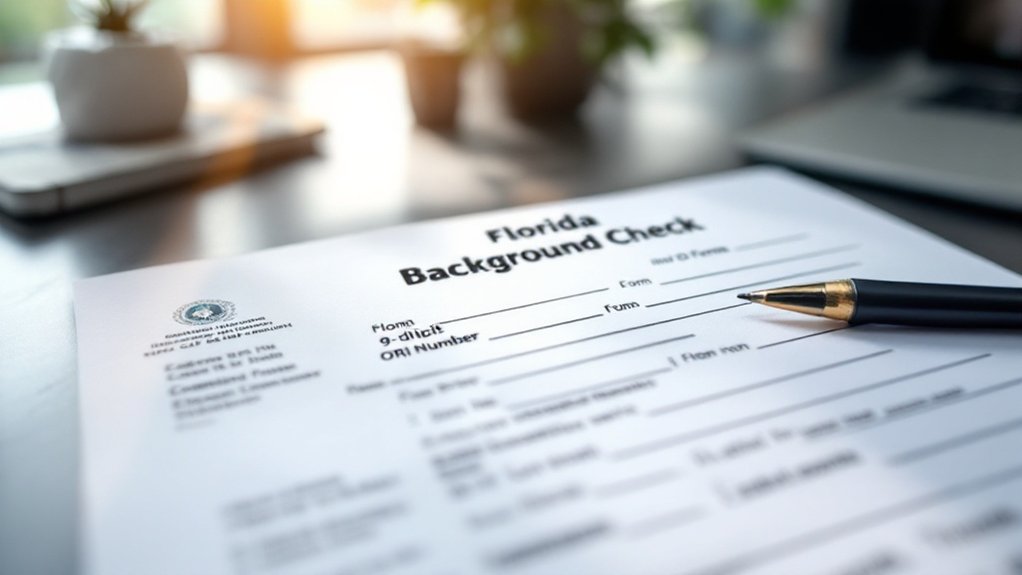When undergoing a Level 2 background check in Florida, you’ll need an ORI number—a unique 9-digit code identifying the requesting agency. This guarantees results are routed correctly and informs the FBI and FDLE about relevant statutes. You typically receive the ORI number from your employer or licensing agency. It often includes the state or agency abbreviation, like “FL,” followed by specific identifiers. Comprehending ORI numbers is vital for compliance and accuracy, and exploring further will provide deeper insights into their role in background checks.
Understanding ORI Numbers

Understanding ORI numbers is indispensable for anyone involved in background checks in Florida. An ORI, or Originating Agency Identifier, is a unique code assigned to agencies for background checks. It identifies the requesting agency and guarantees results are routed correctly. Each agency must have an ORI number for Level 2 background checks, which inform the FBI and FDLE about relevant statutes and result destinations.
You’ll typically receive your ORI number from your employer or licensing agency. It’s vital for ensuring compliance with specific statutes and facilitating accurate delivery of screening results. Incorrect ORI numbers can delay or invalidate the process, so precision is key.
Structure and Format of ORI Numbers
As you explore the structure and format of ORI numbers, you’ll notice they typically consist of a 9-character code. The first two characters usually represent the state or agency, followed by additional characters that may include agency abbreviations or identifiers. In Florida, ORI numbers often start with “FL” and are tailored to specific agencies or professions, such as AHCA and DCF, ensuring precise identification and routing of background check results. Every agency or company requiring a Level 2 background check must have an ORI number to ensure that the results are sent to the correct state department.
Structure and Format of ORI Numbers
When you’re dealing with background checks in Florida, the structure and format of ORI numbers are indispensable for ensuring that results are correctly routed to the requesting agency. Typically, an ORI number is a 9-digit code, starting with two characters that identify the state or agency, followed by additional characters. For example, AHCA uses EAHCA020Z, while DCF General uses EDCFGN10Z. Some ORI numbers begin with “FL” followed by seven digits, possibly ending with a letter like “Z.” These codes embed agency abbreviations, ensuring accurate delivery of background check results.
You’ll notice that ORI numbers are essential for directing results to the right agency, making them fundamental for Level II background checks in Florida. The use of an ORI number ensures that the background check results are sent to the correct agency, which is crucial for compliance with Level II regulations.
Number Structure
The structure of an ORI number is essential for identifying the agency requesting a background check in Florida. Typically, an ORI number is a 9-digit code consisting of 2 characters for state or agency identification, followed by 6-7 additional characters. These codes often include agency abbreviations, such as AHCA or DCF, within the number. For example, EAHCA020Z is used for the Agency for Health Care Administration, while EDCFGN10Z is used for the Department of Children and Families. This structure guarantees that background check results are routed accurately to the appropriate agency. You’ll need to verify your ORI number with the requesting agency to confirm it’s correct. Additionally, using the correct ORI number is crucial because it informs the FBI and FDLE about the relevant statutes governing the background check, ensuring that the process is completed efficiently.
Purpose and Function of ORI Numbers

ORI numbers play a crucial part in Florida’s background check process by serving as unique identifiers for agencies or organizations requesting these checks. They guarantee that criminal history information is delivered to the appropriate regulatory body, facilitating accurate processing and compliance with state and federal regulations.
Some key functions of ORI numbers include:
- Identifying the entity requesting the background check
- Informing the FBI and FDLE about relevant statutes
- Specifying the destination for results
- Guaranteeing compliance with regulations to streamline the process
In addition, ORI numbers are essential for ensuring that background checks are processed efficiently, as they help prevent delays by directing results to the correct agency using a specific ORI code.
Obtaining ORI Numbers for Background Checks
To obtain an ORI number for a background check in Florida, you typically rely on your employer or the agency requesting the check to provide it. This is often part of the hiring process or application for licenses. If your employer doesn’t have the ORI number, they can contact the relevant state agency to obtain it. For court-related matters, you can ask the Clerk of Court for the necessary information.
You should verify the ORI number with the requesting agency to affirm accuracy. Different professions have unique ORI numbers, and formats may vary. Maintaining accurate records and coordinating with state agencies are pivotal for compliance with regulations. Additionally, it is crucial to understand that the ORI number contains an agency abbreviation, which helps identify the specific agency involved in the background check process.
Use of ORI Numbers in Level 2 Background Checks

When you undergo a Level 2 background check in Florida, you’ll need to provide an ORI number, which is a 9-digit code that identifies the requesting agency and guarantees results are sent to the right place. This number is essential for both state and national criminal record checks, helping confirm compliance with relevant statutes governing background checks. By using an ORI number, you can make certain that your background check results are processed correctly and delivered to the appropriate agency, whether it’s for healthcare, education, childcare, or another profession requiring Level 2 checks.
Use of ORI Numbers in Level 2 Background Checks
In Florida, Level 2 background checks rely heavily on ORI numbers to streamline the process. These checks are fingerprint-based, involving both state and national criminal screening, and are required for professions like healthcare providers, educators, and financial services professionals.
To understand how ORI numbers work in Level 2 checks, consider these key points:
- Agency Identification: ORI numbers identify the requesting agency.
- Result Routing: They confirm results are sent to the correct agency.
- Compliance with Regulations: ORI numbers are vital for compliance with state and federal laws.
- Efficient Processing: They specify relevant statutes and offenses to scrutinize.
This guarantees that background checks are processed efficiently and securely. Additionally, Level 2 background checks are designed to ensure that applicants have a suitable background for positions of trust, particularly those involving vulnerable populations, such as working with children.
ORI Number Structure
An ORI number is an indispensable 9-digit code that identifies the agency requesting a background check, guaranteeing that results are sent to the correct state department. Typically, it consists of 2-5 letters followed by numbers, often starting with agency abbreviations like AHCA or DCF, or “FL” followed by numbers. The last character may be a letter, such as “Z.” This structure is vital for routing background check results correctly.
When you encounter an ORI number, you’ll notice it’s designed to be unique to each agency or organization. For example, EAHCA020Z is used for AHCA background checks, while EDCFGN10Z is used for DCF General. This specificity assures that background checks are processed efficiently and accurately.
Statutory Guidance and Compliance
Florida’s statutory framework mandates the use of ORI numbers for fingerprint scans, ensuring compliance with background check regulations. This requirement is pivotal for Level II background checks, which involve both state and federal databases. As you navigate this process, understanding the role of ORI numbers is indispensable for ensuring that your background check results are processed correctly.
- Level II Background Checks: Essential for many jobs and licenses.
- Agency Responsibilities: Agencies must provide ORI numbers to applicants.
- Penalties for Non-Compliance: Delays or rejection of background checks can occur.
- FDLE Oversight: The FDLE manages and issues ORI numbers for background checks. The use of ORI numbers ensures that the results are routed to the correct agency, such as the Florida Department of Law Enforcement, which handles Level II background checks.
Result Routing and Accuracy

When undergoing a Level II background check, you’ll need to guarantee that your ORI number is accurate and correctly applied to your fingerprint scan. This [WORD REPLACEMENT] that the results are routed to the correct agency, preventing delays or misrouting. An ORI number typically consists of 2 characters identifying the state or agency, followed by 6-7 additional characters. It informs the FDLE and FBI where to send the results, specifying which offenses to scrutinize. Providing an incorrect ORI number can prevent the board office from receiving fingerprint results, highlighting the importance of accuracy.
You are responsible for verifying the correct ORI number, which is usually provided by employers or licensing agencies. If unsure, contact the relevant agency for clarification.
Importance of ORI Numbers in Legal Compliance
ORI numbers play an essential role in [guaranteeing/verifying/confirming] legal compliance during Level II background checks in Florida. They are mandatory for these checks, [guaranteeing/verifying/confirming] that results are sent to the correct agency and comply with state regulations. Without an ORI number, the FDLE cannot process the request, leading to delays and potential legal issues.
- Mandatory for Level II Checks: [Guarantees/Verifies/Confirms] compliance with state regulations.
- Agency Identification: Directs results to the correct entity.
- Statutory Compliance: Informs the FBI and FDLE about relevant statutes.
- Result Delivery: [Guarantees/Verifies/Confirms] timely and accurate delivery of background check results.
Regulatory Framework for ORI Numbers in Florida**

Understanding the regulatory framework for ORI numbers in Florida involves recognizing how these identifiers fit into the broader legal landscape of background checks. ORI numbers are vital for ensuring that background check results are sent to the correct agency, and they are typically used in Level 2 checks, which involve both state and national criminal record searches. Florida’s background check process is governed by state laws such as Florida Statute 435 and federal regulations like the Fair Credit Reporting Act (FCRA), which requires applicant consent. Agencies like the Florida Department of Law Enforcement (FDLE) play a key role in processing these checks using ORI numbers.
Conclusion
As you navigate Florida’s background check process, understanding ORI numbers is essential. Think of an ORI number like a precise address, ensuring your background check results reach the right agency. For instance, the Agency for Health Care Administration uses EAHCA020Z, directing results accurately. Without this “address,” your check can’t be processed, highlighting the importance of ORI numbers in maintaining legal compliance and result accuracy.

